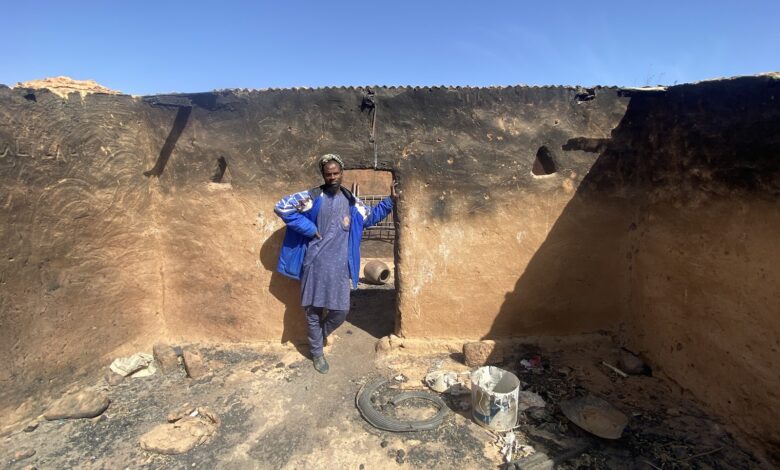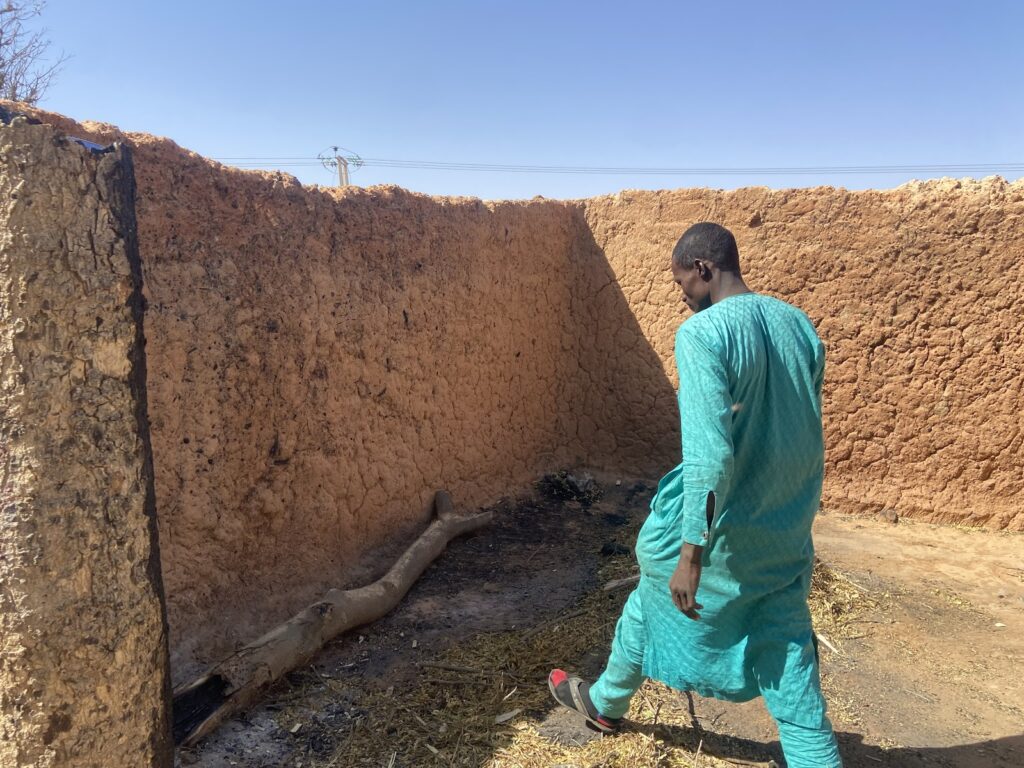Shared Ethnicity With Terrorists Is Putting Fulanis At Risk In North West Nigeria
Law-abiding Fulanis are plagued by the crisis in multiple ways as they face attacks from both terror gangs in the region and local vigilantes on the basis that they share ancestry with the terrorists.

Buhari Umar lives with a bag full of questions. Every time he attempts to break the hush about the attack that took his wife, Aisha, he finds himself gasping for words — they wouldn’t take form since his village, Kaurawo, in the Tangaza area of Sokoto, was couched into silence a fortnight earlier.
In late December 2023, Umar walked us into his burnt hut, drumming his long, thin index finger on the edges of the mud fence before suddenly taking an abrupt pause and pointing at the flake of blood on the wall. “They cut her here. They cut her…,” he snapped and immediately got teary.
That day, early Monday morning, Umar had just observed the Subhi prayer and, together with other members of the congregation, prayed for peace to reign in the troubled region. Against men living next door, who wouldn’t bat an eye before macheting them because they are of different skin tone and tongue, men whose language they speak and perhaps with whom they share a lineage, but who still rustle their cattle and kill and abduct them. They prayed against men across their villages who loot and massacre women and children.
Umar left the mosque and headed home. He met Aisha, who had already put a pot of water on fire, before lying down in his wooden bed. Soon, a bout of loud cries and deafening gunshots would jolt him awake.
Kaurawo was under attack.
“They were entering people’s houses and setting them on fire. As we came running out of the house, they shot at me twice, but I was able to escape. My wife fell towards the exit, and they started hitting her before she could stand up,” Umar paused as he turned to his left and back to his right, as if the assailants were still lurking somewhere around, waiting to pounce when night fell.
The attacks on the Fulani communities, carried out by a group of local vigilantes in the area, were a reprisal for an attack on a commercial vehicle along Ruwa Wuri road in the same area. A nursing mother and her daughter had died in the vehicle burnt down by the terrorists, flaring outrages among the volunteer group.
After Kaurawo, the local vigilantes led the rampage to Bugawa, Ba-gida, Manu, Bajaga and lastly, Buta, near the border with the Niger Republic.
“They took my wife away from me, they butchered her in cold blood. I don’t even know the kind of life that awaits me without my wife. I have to leave the two kids with my mother,” the father of two told HumAngle.

Nigeria’s North West has been plagued by insecurity for years. Terrorists have continued to attack rural villages, kill civilians, sexually assault women, rustle cattle, and mastermind a booming kidnap-for-ransom enterprise across the region. They also enjoy a certain level of socio-political influence and sophistication, so much so that they impose levies on communities and even run illegal mining operations.
There are thousands of them across large swathes of the region’s ungoverned spaces. Many of the groups are believed to comprise mostly ethnic Fulani. But the criminal enterprise cut across all folds with a burgeoning economy driven by criminals from different ethnicities.
Law-abiding Fulanis are plagued by this crisis in multiple ways as they face attacks from the terrorists alongside persecution from local communities, especially vigilantes locally known as ‘Yan sakai, on the basis that they share ancestry with the terrorists.
This ethnic profiling and extrajudicial killings of Fulanis continue to stoke the embers of the conflict that has killed thousands of people and displaced hundreds of thousands more.
Bello Turji, a notorious terror kingpin operating in Sokoto and Zamfara, had once written to local authorities expressing concerns over the maltreatment of the ethnic Fulani, reiterating later that his group was fighting to protect the Fulanis against local vigilantes that “attack, maim, and extrajudicially kill his people”.

One Saturday afternoon in late December, Bugawa was eerily empty and filled with a foul stench of rotting animals and fowls. Residents had fled the village following the attack by the vigilantes. Among them is Buba Muhammad. The 35-year-old lost everything he had worked for in one fell swoop that day.
He was only able to escape death by a whisker, but his house – including other things in it – took the fall. It was razed to the ground.
Now staying with relatives in Kaurawo, Muhammad sat with elders of the other villages, reminiscing on the good old days they had in their communities. It was barely a decade ago. The days of living without having to watch over their shoulders. Of devouring Fura in the same bowl as their neighbours. When it wasn’t always love lost between them.
“We grew up together. These were our friends when we were still little,” he said, referring to the local vigilante. “They used to come to our Ruga and while away their time. How can they accuse us of something we know nothing about?” he asked, eyeing no one in particular.
It didn’t matter that Monday when the irate vigilantes got to Bugawa. Muhammad said some of them had hoods over their faces and cried, ‘We came for war! We came for war!’ He says they tried to talk to them. “We even tried to talk to them, but then they started shooting. We had to run for our lives.”
The attack would later desolate Bugawa and other villages along the route.
“It is unfair. Bandits don’t leave us, vigilantes won’t stop labelling us. There is no reason someone irresponsible will commit a crime, but revenge will be taken on us. These things are really devastating to us,” he added.
Bello Magaji, the community head of Ba-gida, sighed, massaging his ankle. He had fled his village, about 4 km away from Kaurawo, for safety. He believes that both communities need to sit to “come up with a system that will make us (we and them) live peacefully because nothing is as sweet as peace”.
“All we need is peace. As long as you are a leader, you don’t want anything that will scatter the peace of your people. We want to live with them harmoniously. If they are suspecting anybody in our community, they should report him to us. We know the action we are going to take on him, but killing and burning down our houses is not the way out.
Support Our Journalism
There are millions of ordinary people affected by conflict in Africa whose stories are missing in the mainstream media. HumAngle is determined to tell those challenging and under-reported stories, hoping that the people impacted by these conflicts will find the safety and security they deserve.
To ensure that we continue to provide public service coverage, we have a small favour to ask you. We want you to be part of our journalistic endeavour by contributing a token to us.
Your donation will further promote a robust, free, and independent media.
Donate HereStay Closer To The Stories That Matter




